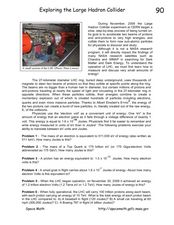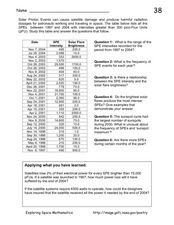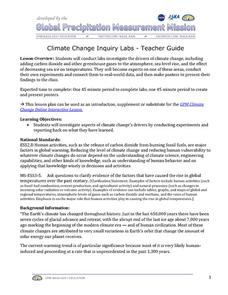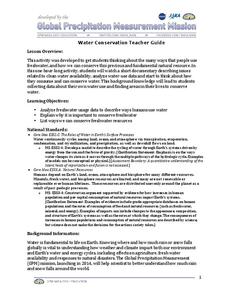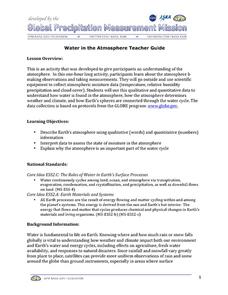Curated OER
Stars and Slopes
More of a math lesson than physics or space science, high schoolers take a set of data and plot it on a log-log coordinate system. The write-up for day two was never completed, but day one, "Stars and Slopes," is complex and cohesive....
Curated OER
Good Vibrations Remote Sensing data Collection: Thermal Emission Spectrometer
The Mars Global Surveyor spent two years creating a mineral map of the planet Mars using thermal emission spectrometry. To help young astronomers understand this remote sensing instrument, have them simulate how data is collected and...
Curated OER
3-2-1 Pop!
Young scholars investigate how rocket liftoff demonstrates Newton's Laws of Motion. They participate in a class discussion, and construct a rocket powered by the pressure generated from an antacid tablet reacting with water.
Curated OER
Getting in Shape
Young scholars create tangram rockets out of shapes and practice shape recognition.
NASA
Water Rocket Launcher
How can you launch an object that isn't propelled by air? The resource provides directions to build a launcher to launch rockets made of two-liter bottles. The launcher, built mainly from materials found at the local hardware store, uses...
NASA
Water Rocket Construction
What are the basics for building a rocket out of a two-liter bottle? The procedures outline the basics to create an air- and water-powered bottle rocket. Prior to launching the rockets, teams perform safety checks to ensure their designs...
NASA
Rocket Races
And they are off! Using Styrofoam meat trays and balloons, individuals build racers that demonstrate Newton's Third Law of Motion. Pupils run their racers three times and make improvements between each trial. To conclude the activity,...
Curated OER
Space Science: Adventure is Waiting
These full-color handouts feature two activities. The first is a reading on comets, meteors, and meteoroids. Your space science learners will examine ten phrases and determine which of the three each characterizes. The second activity...
NASA
Newton Car
If a car gets heavier, it goes farther? By running an activity several times, teams experience Newton's Second Law of Motion. The teams vary the amount of weight they catapult off a wooden block car and record the distance the car...
Curated OER
Cosmic Chemistry: An Elemental Question
Space scientists investigate the cosmic phenomena in order to search for answers to possible origins of the solar system. They consider the concepts of elements and isotopes. Data is analyzed looking at tje abundance of elements...
Curated OER
Background Radiation and Lifestyles
In this radiation and lifestyles worksheet, students are given 5 problems about a person which indicate her exposure to radiation. Students calculate her total dosage to radiation in each problem based on her exposure.
Curated OER
How To Build a Planet From The Inside Out!
High schoolers read about the Spitzer Space Telescope and the technology used to learn about planet composition. They calculate the radius of a planet, the size of a planet, the average density of a planet and the likely core composition...
Curated OER
Exploring the Large Hadron Collider
On this physics handout, pupils read about the Hadron Collider used to make new sub-atomic particles by accelerating protons. They solve 6 math problems that include translating electron volts to Joules. This is geared toward high school...
Curated OER
Cross Sections and Collision Times
High schoolers solve five problems including finding the cross sectional area of two bodies, determining the swept out volume of a moving body, finding the average particle volume of a body and determining the collision time for a body.
Curated OER
Solar Proton Events
On this worksheet, space scientists use a data table to answer questions about the relationship between the brightness of solar flares and the intensity of the solar proton events. They apply what they learned from the data to address...
Curated OER
Gelatin Volcanoes
Students investigate magma flow using gelatin volcano models. In this earth science lesson, students sketch the magma bodies as observed from the top of their model. They explain why magma moves that way.
Curated OER
Regolith Formation
Students explain the difference between regolith formation on Earth and the Moon. In this space science lesson, students model the different factors affecting regolith formation on Earth. They identify the different types of weathering.
NASA
Building for Hurricanes: Engineering Design Challenge
"By the hair on your chinny-chin-chin, I'll huff and I'll puff and I'll blow your house in," says the big, bad wolf! Engineering hopefuls are challenged to design and construct a hurricane-proof building from simple office and craft...
NASA
Climate Change Inquiry Lab
With global temperatures on the rise faster than ever recorded, the effects of a heating planet could be devastating. Allow learners to discover just what the world is in store for if the warming continues through a series of videos, a...
Curated OER
Connect the Spheres: Earth Systems Interactions
Is everything really connected? Take your class on a walk outside, where they will make observations and write them down on a worksheet. Once they are back in the classroom, learners will work to determine if and how things like birds,...
Curated OER
Earth's Water
If the majority of our planet is covered with water, why do we need to bother conserving it? With a thorough and varied investigation into the location and types of water on the earth, learners will gain an understanding of why this...
Curated OER
Water Conservation
Open learners' eyes to the challenge of finding safe drinking water – something we often take for granted in our country. The PowerPoint presentation includes images, graphs, diagrams, and even a video to stimulate discussion on how we...
Curated OER
The Water Cycle
Your class sets up a mini water cycle model to examine the process. Then they watch an animation, following a water molecule through the cycle. A well-developed lab sheet guides learners through the instructional activity and a...
Curated OER
Water in the Atmosphere
A slide show serves as the backdrop for a instructional activity on the moisture in Earth's atmosphere. Through it, mini meteorologists learn about the attributes of the atmosphere and actually use data-collecting weather tools to make...
Other popular searches
- Nasal Passages
- About Nasa
- Nasa Planets
- Nasa Robots
- Nasa Lesson Math
- Nasa Aircraft
- Nasa Materials
- History of Nasa
- Nasa Lesson Plans
- Nasa Web Based Textbook
- Nasa Aurora
- Contributions of Nasa














